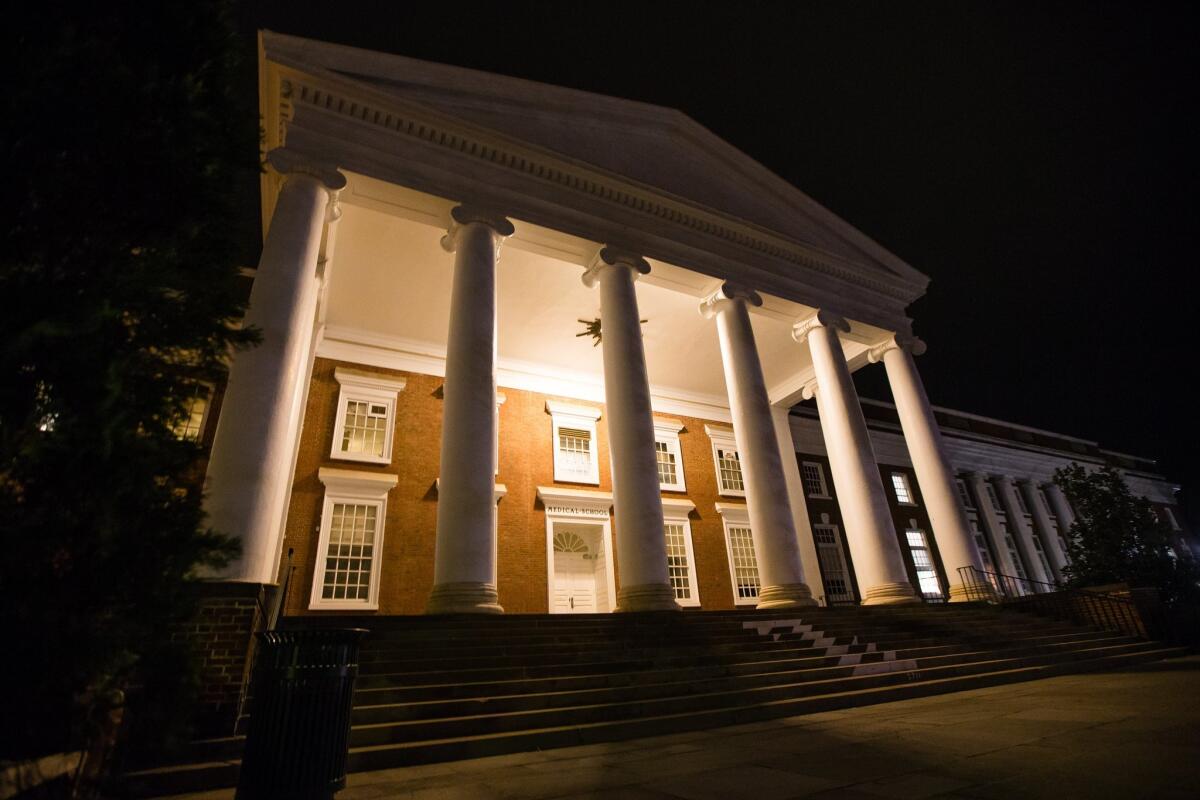Rolling Stone retracts rape report, apologizes after ‘painful’ review

The University of Virginia in Charlottesville.
- Share via
Rolling Stone magazine retracted a discredited story about an alleged gang rape at the University of Virginia after a devastating independent review by Columbia University deemed it a “journalistic failure that was avoidable.”
“The report was painful reading, to me personally and to all of us at Rolling Stone,” Will Dana, the magazine’s managing editor, said in an editor’s note appended to the outside review published on Rolling Stone’s website Sunday, and cross-published on the website of the Columbia Journalism Review magazine. “It is also, in its own way, a fascinating document — a piece of journalism … about a failure of journalism.”
By Sunday night, the original story had been replaced on Rolling Stone’s website with the Columbia Journalism Review report.
The trouble began when Rolling Stone writer Sabrina Rubin Erdely set out to find a single story that would be “emblematic” of what rape and sexual harassment is like on American campuses, according to the Columbia report.
What Erdely thought she found at the University of Virginia — when she interviewed a student named Jackie — was not just traumatic, but horrific.
Erdely’s explosive story, published in Rolling Stone in November, said Jackie had been attacked and gang-raped for hours by seven men at a fraternity house as one of her fellow lifeguards from the university pool cheered them on. The story got 2.7 million page views, the most of any noncelebrity story in Rolling Stone’s online history.
But instead of drawing fresh scrutiny to sexual violence on college campuses, the story instead became a parable in how not to report — the kind likely to be taught in journalism classes, and a mark of shame for one of America’s most respected magazines.
The Columbia Journalism Review report uncovered multiple lapses of reporting and fact-checking in Rolling Stone’s dubious account of the rape, whose basic details could not be corroborated.
The Columbia report was hardly the first to find fault with the story. Other media quickly uncovered discrepancies, and in March, Charlottesville, Va., police announced that they could find no evidence that the attack happened. Columbia’s report reached a similar conclusion, calling the story a failure of journalism.
“The failure encompassed reporting, editing, editorial supervision and fact-checking,” wrote the Columbia authors — Sheila Coronel, dean of academic affairs at Columbia Journalism School; Steve Coll, the journalism school dean; and Derek Kravitz, a postgraduate research scholar at the journalism school. “The magazine set aside or rationalized as unnecessary essential practices of reporting that, if pursued, would likely have led the magazine’s editors to reconsider publishing Jackie’s narrative so prominently, if at all.”
The Columbia authors suggested several policy changes that might prevent similar mistakes in the future — including a ban on pseudonyms, which can be a crutch for weak reporting.
Rolling Stone editors saw no need “to change their editorial systems,” the Columbia report said. But Sunday night, Rolling Stone’s editor’s note on the report said, “We are also committing ourselves to a series of recommendations about journalistic practices that are spelled out in the report.”
None of the editors involved with the story will be fired and Erdely is expected to continue writing for the magazine as a contributing editor, a Rolling Stone spokeswoman confirmed in an email.
The Nov. 19 Rolling Stone story, “A Rape on Campus: A Brutal Assault and Struggle for Justice at UVA,” was published at a time of rising national concern over the prevalence of sexual assaults on college campuses. The initial public reaction was one of revulsion and outrage, not skepticism.
But within weeks, as competing media and Erdely herself raised doubts about the story, Rolling Stone requested the investigation by the Columbia Journalism School, one of the most respected in the country. Rolling Stone said it did not pay Columbia for the inquiry.
Erdely apologized Sunday, calling the last few months “among the most painful of my life. Reading the Columbia account of the mistakes and misjudgments in my reporting was a brutal and humbling experience.”
She apologized “to Rolling Stone’s readers, to my Rolling Stone editors and colleagues, to the UVA community, and to any victims of sexual assault who may feel fearful as a result of my article.”
The story had shaken the University of Virginia, where officials swiftly suspended fraternity activities and asked local police to investigate the allegations.
In a statement Sunday night, University of Virginia President Teresa A. Sullivan condemned Rolling Stone’s reporting. The story “did nothing to combat sexual violence, and it damaged serious efforts to address the issue,” Sullivan said. “Irresponsible journalism unjustly damaged the reputations of many innocent individuals and the University of Virginia.”
In response to the magazine’s claims that the university had inadequately handled Jackie’s case, Sullivan said, “The Charlottesville Police Department investigation confirms that far from being callous, our staff members are diligent and devoted in supporting and caring for students.”
The Columbia authors concluded that Erdely might have discovered discrepancies in Jackie’s stories if she had pressed harder in her reporting and worked to corroborate basic facts Jackie had provided. For instance, Erdely did not provide the accused fraternity with the date of Jackie’s alleged rape; if she had, the fraternity might have contradicted Jackie’s contention there had been a social event on that night. (There was none.)
Instead, Erdely relied heavily on Jackie’s version of events, even as Jackie was sometimes skittish about continuing to provide her cooperation for the story.
In one interview outlined in the Columbia report, Jackie balked when Erdely asked for the last name of “Drew,” the lifeguard Jackie accused of organizing her rape.
“I’m not going to use his name in the article, but I have to do my due diligence anyway,” Erdely told Jackie, according to the Columbia authors’ recounting of Erdely’s notes. “I imagine he’s going to say nothing, but it’s something I need to do.”
“I don’t want to give his last name,” Jackie said. “I don’t even want to get him involved in this.... He completely terrifies me. I’ve never been so scared of a person in my entire life, and I’ve never wanted to tell anybody his last name.... I guess part of me was thinking that he’d never even know about the article.”
“Of course he’s going to know about the article,” Erdely said. “He’s going to read it. He probably knows about the article already.”
Jackie, sounding “shocked,” responded, “I don’t want to be the one to give you the name.”
After that, Jackie stopped responding to messages for two weeks, according to the Columbia report, ultimately leading Rolling Stone to win her back by agreeing to use a pseudonym for her attacker.
“From that point on, through the story’s publication, Jackie cooperated,” the report says.
An attorney for Jackie declined to comment Sunday. Jackie did not cooperate with the Columbia report’s authors or with Charlottesville police.
The Columbia investigators concluded that, “If Jackie was attacked and, if so, by whom, cannot be established definitively from the evidence available.” The conclusion paralleled that of Charlottesville police, who announced March 23 that they had suspended their investigation after finding no evidence of a rape.
“Unfortunately, we’re not able to conclude to any substantive degree that an incident consistent with the facts in that article [occurred at the fraternity house named in the Rolling Stone story] or any other fraternity house, for that matter,” Charlottesville Police Chief Timothy Longo said in March at a televised news conference. “That doesn’t mean that something terrible did not happen to Jackie.... I can’t prove that something didn’t happen.”
Rolling Stone said it would print a condensed version of Columbia’s 12,644-word report in its April 8 issue.
Dana, the managing editor, acknowledged Sunday that the magazine had botched the story by not contacting Jackie’s alleged attackers.
“In trying to be sensitive to the unfair shame and humiliation many women feel after a sexual assault, we made a judgment — the kind of judgment reporters and editors make every day,” Dana wrote. “We should have not made this agreement with Jackie and we should have worked harder to convince her that the truth would have been better served by getting the other side of the story.”
Twitter: @mattdpearce
More to Read
Sign up for Essential California
The most important California stories and recommendations in your inbox every morning.
You may occasionally receive promotional content from the Los Angeles Times.










